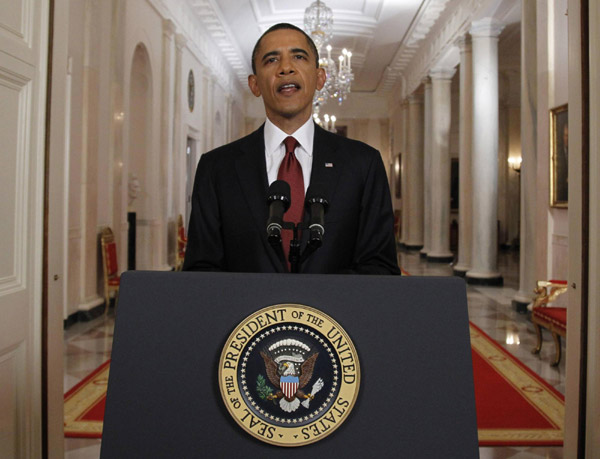UN chief hails bin Laden's death as 'watershed'
UN Secretary-General Ban Ki-moon said Monday that the death of Osama bin Laden, the mastermind behind some of the world's most notorious terrorist attacks, represents a "watershed moment" in the fight against the scourge of terrorism.
U.S. President Barack Obama announced late Sunday that Osama bin Laden – the founder and head of Al-Qaida – was killed by US forces at a compound in the Pakistani town of Abbottabad, which is located close to the capital, Islamabad.
 |
|
US President Barack Obama is pictured after announcing live on television the death of Osama bin Laden, from the East Room of the White House in Washington May 1, 2011. [Photo/Agencies] |
Speaking to reporters at United Nations Headquarters in New York, Ban said it was "a day to remember the victims and families of victims, here in the United States and everywhere in the world."
Bin Laden claimed responsibility for the 11 September 2001 attacks in the US that claimed the lives of nearly 3,000 people. He is also believed to be responsible for organizing or funding many other attacks, including the 1998 bombing of two US embassies in East Africa, the 1995 bombing of a Saudi security training centre in Riyadh and numerous attacks inside Afghanistan.
Ban described bin Laden's death as "a watershed moment in our common global fight against terrorism. The crimes of Al-Qaida touched most continents, bringing tragedy and loss of life to thousands of men, women and children."
In a statement he voiced relief at the news and commended "the work and the determined and principled commitment of many people in the world who have been struggling to eradicate international terrorism."
Ban stressed that the UN would continue to lead the global campaign against terrorism, drawing from the counter-terrorism strategy adopted by the General Assembly.
His remarks were echoed by General Assembly President Joseph Deiss, who said that the UN's fight against terrorism is "undertaken in the name of all victims. Terrorists must know that there will be no impunity for their barbaric and cowardly deeds."
Deiss stressed that terrorism remains unacceptable, regardless of what form or purpose it takes.
Ambassador Gérard Araud of France, which holds the rotating Security Council presidency this month, read out a presidential statement in which the 15-member panel welcomed the news that bin Laden "will never again be able to perpetrate such acts of terrorism."
The statement urged all countries to remain vigilant and intensify their efforts to defeat terrorism, including by working together to bring to justice the perpetrators, organizers and sponsors of terrorist attacks.
"The Security Council stresses… that terrorism will not be defeated by military force, law enforcement measures and intelligence operations alone, and can only be defeated by a sustained and comprehensive approach involving the active participation and collaboration of all States, and relevant international and regional organizations and civil society to address the conditions conducive to the spread of terrorism and to impede, impair, isolate and incapacitate the terrorist threat."
Yury Fedotov, the Executive Director of the UN Office on Drugs and Crime (UNODC), noted that the huge number of lives lost around the world as a result of the activities of Al-Qaida.
Welcoming Monday night's news, he stressed that nevertheless "there remains significant work in addressing terrorism, including tackling conditions that lead to or facilitate terrorism and building the legal basis needed to work against this threat to human security in a humane and effective manner."
 0
0 






